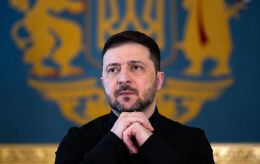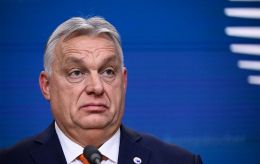Grain of discord: What's happening between Ukraine and Poland
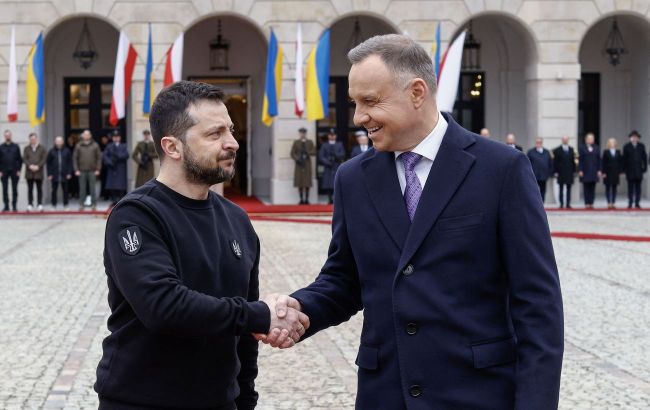 Volodymyr Zelenskyy and Andrzej Duda (Photo: Getty Images)
Volodymyr Zelenskyy and Andrzej Duda (Photo: Getty Images)
Why relations between Kyiv and Warsaw have deteriorated, what Ukrainian grain exports have to do with it, and what influence the upcoming parliamentary elections in Poland have on the situation, read in RBC-Ukraine's material below.
During the preparation of the material, the following sources and information were used: data from the Polish portal farmer.pl, statements from Polish and Ukrainian officials, Polish President Andrzej Duda, Ukrainian President Volodymyr Zelenskyy, statements from the Ministries of Foreign Affairs of Poland and Ukraine, as well as comments from experts for RBC-Ukraine.
After the start of the full-scale Russian invasion, Poland became one of Ukraine's main allies, providing its territory for the transit of weapons, supplying Ukrainian forces with dozens of tanks, and hosting millions of Ukrainian refugees. It seemed that Kyiv and Warsaw had put aside their past disagreements, at least until Ukraine would achieve victory in the war. However, today, tensions have arisen once again in Ukrainian-Polish relations, with Ukrainian grain becoming a point of contention.
The first problems began in the spring of this year when Poland, along with four other European countries (Hungary, Slovakia, Bulgaria, and Romania), imposed restrictions on the import of Ukrainian food. However, Warsaw was the catalyst for this decision.
In February, protests by Polish farmers erupted. They blocked railways and roads, customs checkpoints on the border with Ukraine, staged protests, and took to the streets of cities, demanding that their government ban the import of grain from Ukraine. They argued that they couldn't compete with cheaper Ukrainian agricultural products, which flooded the Polish market after Ukraine's ports were blocked.
Before the full-scale invasion, almost all grain exports from Ukraine were shipped by sea, primarily to Asian and African countries. Only a small portion of grain exports reached the European market, and it was also primarily transported by sea. However, the war brought about changes.
The blockade of Ukrainian ports forced Kyiv to seek alternative supply routes for grain. Poland, in particular, agreed to provide its territory and ports for the further shipment of Ukrainian food. Consequently, it became one of the primary transit countries for Ukrainian grain. According to Polish agricultural media, from January to August 2022, Ukrainian grain exports to Poland increased by a staggering 180% compared to the same period in 2021.
.jpg) Photo: Due to the blockade of ports, Ukraine began exporting grain through Poland (Getty Images)
Photo: Due to the blockade of ports, Ukraine began exporting grain through Poland (Getty Images)
However, as reported by Polish media, a portion of the grain that was supposed to transit to Africa and other countries ended up accumulating in storage facilities in Poland. Meanwhile, Polish farmers, expecting global grain prices to remain as high as they were the previous year, did not rush to sell their produce and also kept it in storage. The call not to rush the sale of grain even came from the then Polish Minister of Agriculture, Henryk Kowalczyk. However, the result was different from what was expected.
When grain prices worldwide surged, they began to sharply decline in Poland. While in the first half of 2022, the average price of consumption wheat ranged from 1600 to 1800 Polish zlotys per tonne, in March 2023, it fell to a thousand, and in May, it dropped to 900. At the same time, cheap Ukrainian grain continued to flow into the country. The expected losses did not sit well with Polish farmers, leading to protests, and the temporary ban on Ukrainian grain imports, introduced on April 16.
In May, the situation attracted the attention of the European Commission, which imposed its own embargo on the sale of Ukrainian agricultural products in Poland, Hungary, Slovakia, Bulgaria, and Romania until June, in exchange for these countries lifting their unilateral restrictions. The European Commission also promised financial support to farmers in these countries to mitigate their losses. Later, the duration of the grain embargo was extended until mid-September.
While the unilateral restrictions imposed by European countries caused outrage in Ukraine, the European Commission's decision was accepted with understanding. Tensions decreased, but as the date for reviewing the embargo approached, the situation began to escalate once again.
Ukraine insisted that there were no grounds for extending the restrictions, while Poland demanded an extension of the embargo. Moreover, Warsaw was prepared to make another unilateral decision. In the end, this is what happened. In mid-September, the European Commission announced its verdict – the embargo would not be extended, and Ukraine had to regulate its exports. Poland – implemented unilateral restrictions. Slovakia and Hungary followed suit with their respective decisions.
Escalation over grain
After Poland, Slovakia, and Hungary unilaterally imposed restrictions on Ukrainian grain, the Ukrainian government filed lawsuits with the World Trade Organization (WTO). On September 18, the Minister of Economy, Yulia Sviridenko, stated, "It is crucial for us to prove that individual member states cannot prohibit the import of Ukrainian goods. Therefore, we are filing lawsuits against them in the WTO."
Sviridenko explained that Ukraine viewed its neighbors' decisions as an unacceptable violation of international commitments because trade policy should be regulated at the EU level. At the same time, she expressed hope that the restrictions would be lifted, and Ukraine wouldn't have to engage in lengthy legal disputes with its partners.
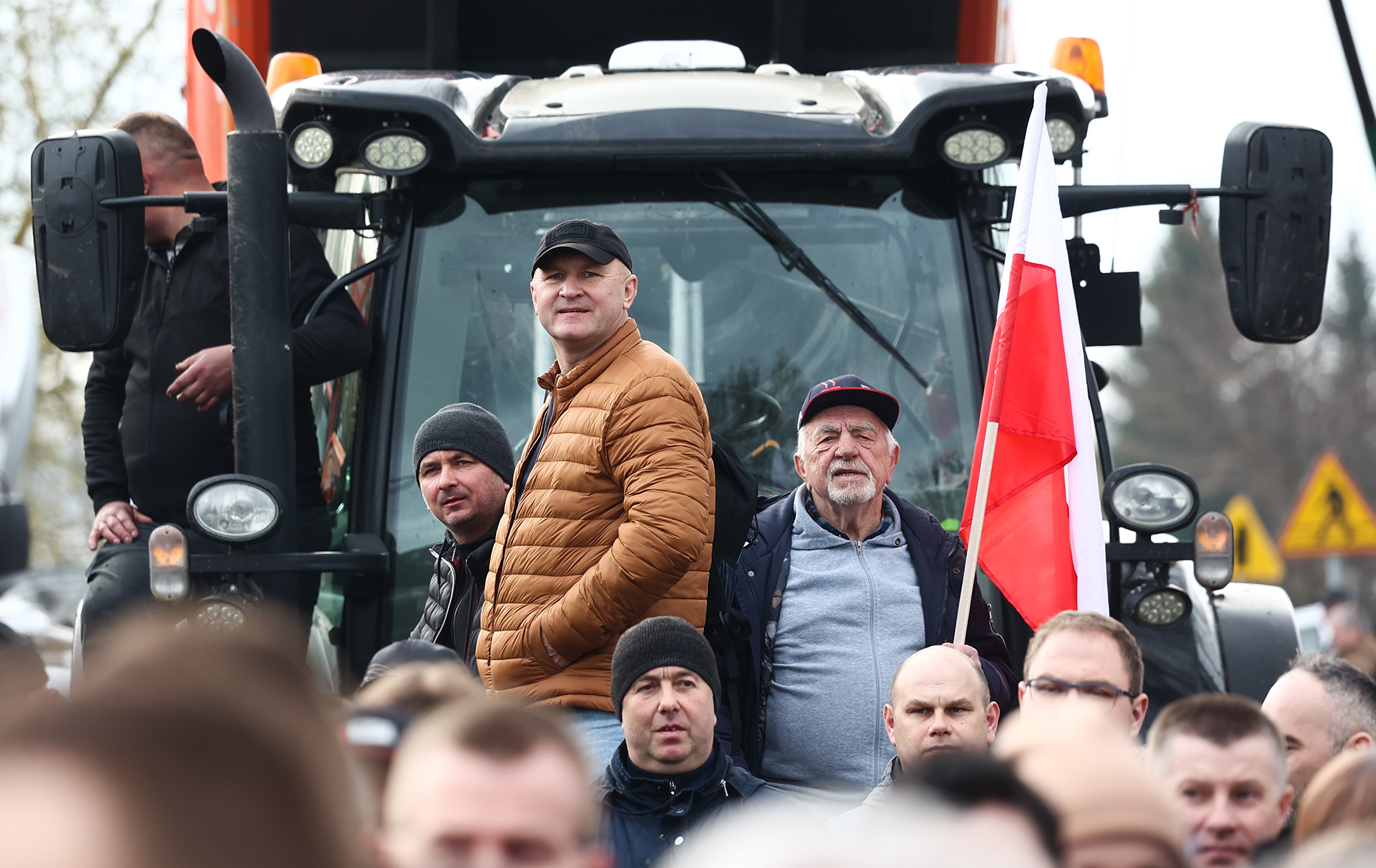
Photo: Polish farmers protested against the import of Ukrainian grain (Getty Images)
In Poland, the Ukrainian lawsuit to the WTO was met with criticism. Polish Minister of Agriculture Robert Telus stated that he was not afraid of potential consequences at the WTO level because he didn't believe there was a legal basis for it. He referred to the idea of Poland filing a lawsuit to support its farmers as "funny."
It seems that the Ukrainian authorities have decided not to stop at the WTO lawsuit. In a comment to Polish media, Ukraine's trade representative Taras Kachka announced an embargo on onions, tomatoes, cabbage, and apples from Poland. He explained this move by saying that Kyiv wanted to convince Warsaw to comply with the European Commission's decision.
As Kachka previously assured in a conversation with RBC-Ukraine, there was no actual harm from Ukrainian goods on the Polish market. "If you have introduced a ban, and the problem has not disappeared, then the problem is not with Ukrainian goods. The problem is not related to commerce," said Ukraine's trade representative.
President Volodymyr Zelenskyy's speech at the UN General Assembly further fueled the fire. When discussing the grain export issue, Zelenskyy strongly criticized some European countries, including Ukraine's neighbors.
"And it is alarming to see how some in Europe, some of our friends in Europe, play out solidarity in a political theater – making a thriller from the grain. They may seem to play their own role but in fact they are helping set the stage to a Moscow actor," said the President from the General Assembly podium.
As expected, such a sharp statement did not go unnoticed, and the Polish side responded. Polish Prime Minister Mateusz Morawiecki warned the Ukrainian government against "inflaming" the situation and threatened to extend the embargo to an even greater list of goods. Polish President Andrzej Duda also commented on Zelenskyy's words, saying, "Ukraine is like a drowning man, it can drag us into the depths."
This exchange of statements and actions between Ukraine and Poland has contributed to the tension in their relations, primarily related to the grain trade issue.
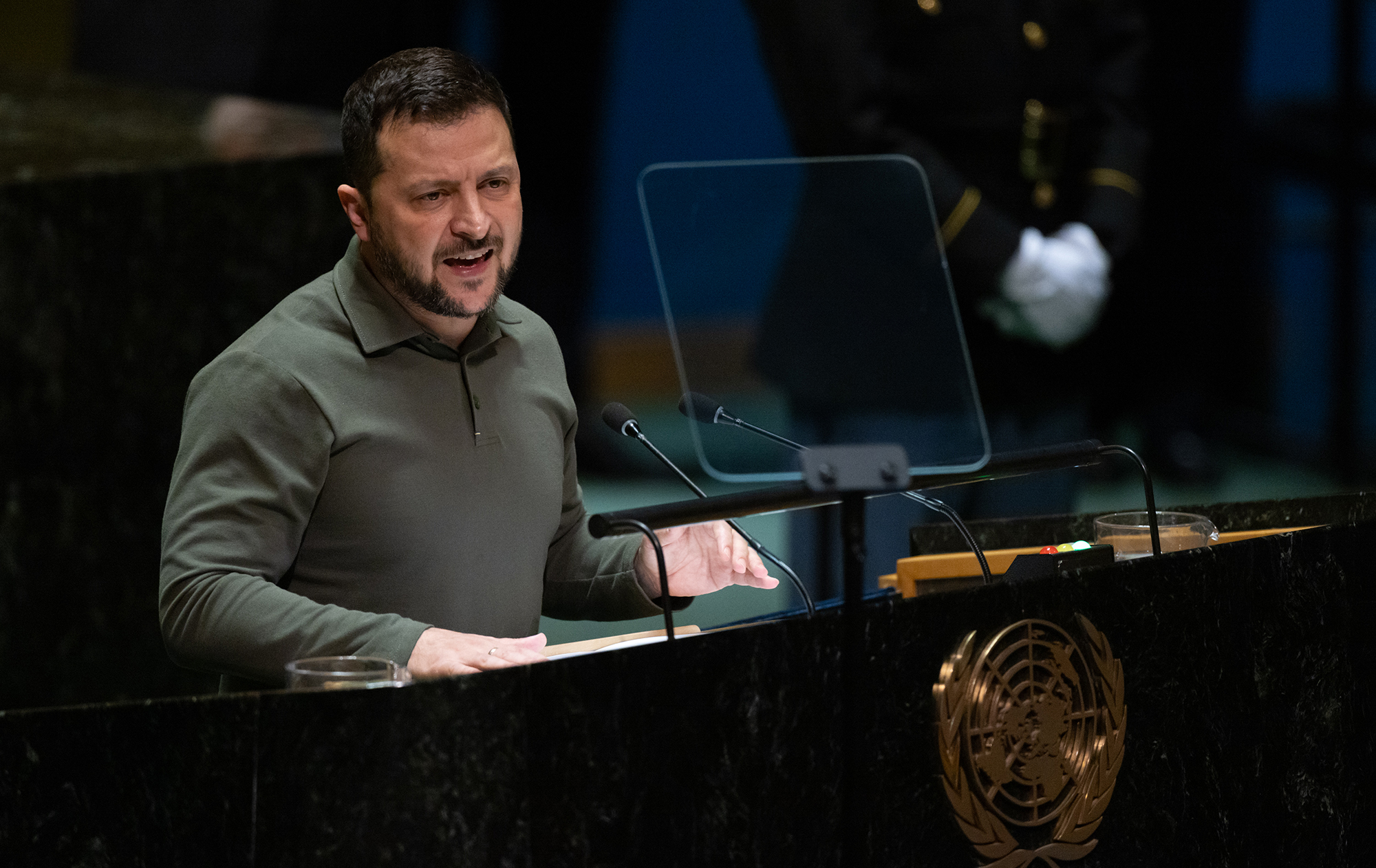 Photo: Zelenskyy criticized Poland from the UN General Assembly podium (Getty Images)
Photo: Zelenskyy criticized Poland from the UN General Assembly podium (Getty Images)
Duda also stated that he couldn't meet with Zelenskyy on the sidelines of the UN General Assembly. The Polish President cited a "tight schedule," but it's clear that this was a response to Zelenskyy's criticism. An interesting point is that Duda announced this meeting himself, while the Ukrainian side hadn't mentioned any such plans.
Furthermore, Poland's Ministry of Foreign Affairs summoned the Ukrainian ambassador for a conversation to express a strong protest over Zelenskyy's words. The Ukrainian side decided not to escalate the already tense situation and, instead of retaliatory actions, issued a statement calling for "setting aside emotions" and taking a constructive approach to resolving the grain issue.
"During this meeting, the Ukrainian ambassador once again clarified Ukraine's position on the unacceptability of Poland's unilateral ban on grain imports. We call on our Polish friends to set aside emotions. The Ukrainian side has proposed a constructive path for resolving the grain problem with Poland. We expect that our proposals will form the basis for moving the dialogue in a constructive direction," said the statement by the spokesperson of the Ukrainian Ministry of Foreign Affairs," stated Spokesperson for Ministry of Foreign Affairs of Ukraine Oleg Nikolenko.
According to Polish political analyst Łukasz Adamski in a comment to RBC-Ukraine, Zelenskyy's words from the UN General Assembly podium were offensive to the Polish political establishment and society, which is why they provoked such a reaction from Warsaw.
"No one expected that President Zelenskyy, having the opportunity to speak at the UN General Assembly, would essentially say that Poland is supposedly an ally of Russia. This was perceived as a huge insult. It also led to a certain escalation," he noted.
Ukrainian political analyst Volodymyr Fesenko believes that Zelenskyy might indeed have refrained from touching upon this topic in his speech at the UN General Assembly. However, according to him, it's important to remember that this information scandal initially came from Poland. When Ukraine responded, Warsaw began accusing Kyiv of ingratitude. A scandal between the two countries flared up earlier in August due to a statement made by a representative of the Polish president's office, Marcin Pshidach.
In an interview with a Polish television channel, Pshidach commented on Kyiv's dissatisfaction with the grain restrictions, stating that "Ukraine should start appreciating the role that Warsaw played for Kyiv recently." The Ukrainian Ministry of Foreign Affairs immediately summoned the Polish ambassador for explanations, and Poland responded in kind. Despite tensions easing over the following weeks, the problem, as can be seen, hasn't disappeared.
Statements of alleged ingratitude by Ukraine, according to Fesenko, are a speculation on the Polish side, as Kyiv has repeatedly expressed gratitude to Warsaw for its assistance and continues to do so. However, Poland's ultimatum-like behavior, in the view of the political analyst, appears as a kind of "lordly superiority."
"Partners don't behave this way; partners sit down at the negotiating table and seek compromises. But they tell us, 'You must do as we say because we helped you.' However, we also needed to resolve the conflict not only through the European Commission but also through negotiations with Poland. But they had no intention of negotiating," he added.
The election factor
According to Fesenko, the primary source of today's problem is competition in the agricultural markets. This issue didn't arise today but existed before. A similar view is held by Polish experts. Polish farmers, unlike their Ukrainian counterparts, have small-scale farms and are highly sensitive to changes in their income, as explained by Adamski. Therefore, they demand government action to prevent Ukrainian products from entering the local market in large quantities.
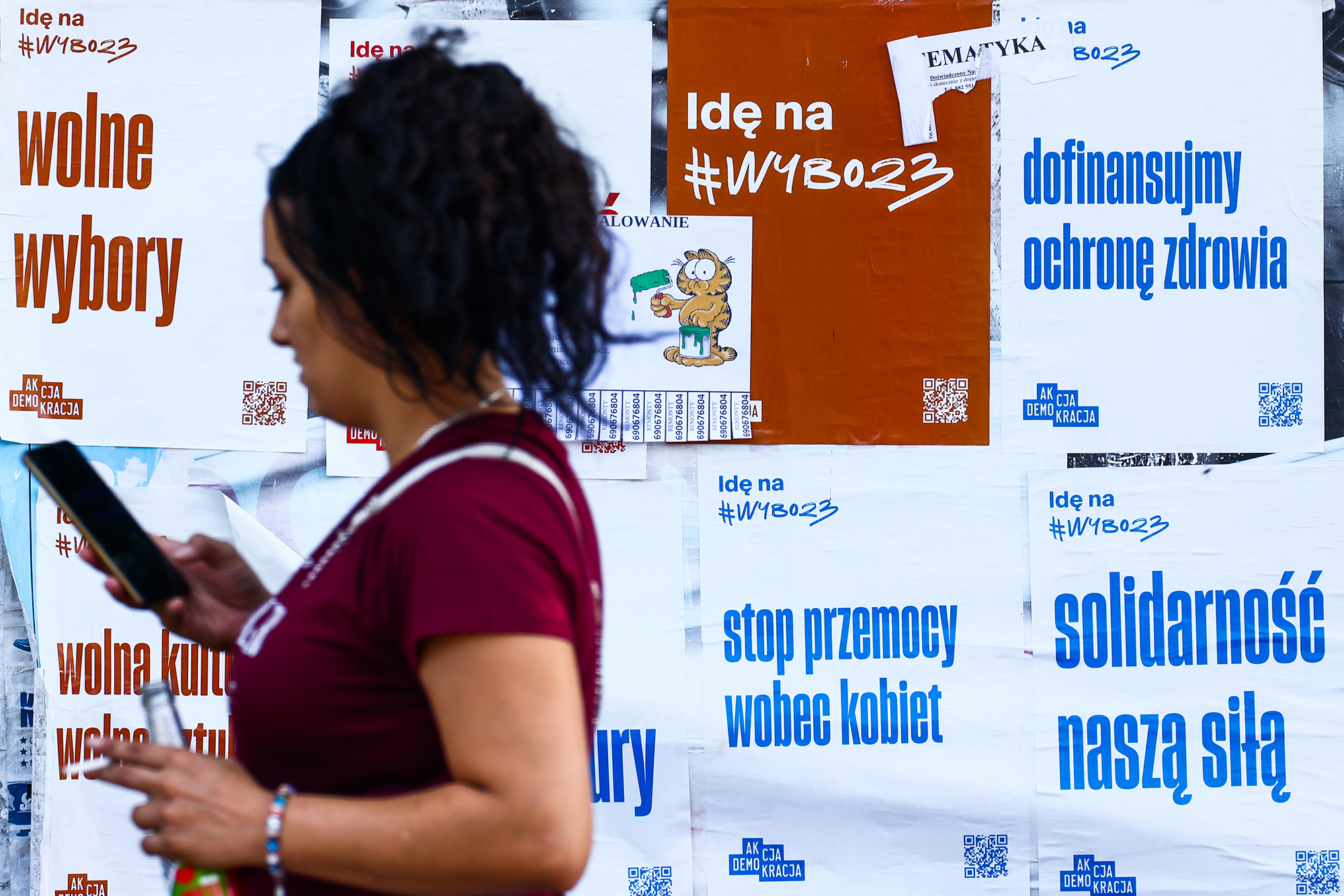 Photo: The approach of parliamentary elections affects Poland's rhetoric (Getty Images)
Photo: The approach of parliamentary elections affects Poland's rhetoric (Getty Images)
It is evident that Poland, like any other country, defends its own national interests. However, as Fesenko believes, the catalyst for the conflict with Ukraine has been the parliamentary elections in Poland, scheduled for mid-October this year.
"I think the emotions wouldn't have been as sharp if it weren't for the Polish elections. Representatives of the ruling Polish party are now starting to use this issue because farmers are their target group," Fesenko suggested. Therefore, any actions by the Polish government that may not be well-received by local farmers can be expected to continue at least until the end of the election race.
The closer the elections get, the sharper the statements from the Polish side become. For instance, recently, the Polish Prime Minister's Office suggested reducing financial support for Ukrainian refugees, and Poland's Minister for EU Affairs, Szymon Szynkowski vel Sęk, warned that the grain scandal could reduce support for Ukraine among Poles. Furthermore, the Minister of Agriculture, Telus, did not rule out that Poland might block Ukraine's accession to the EU if the grain issue was not resolved by then.
"If we don't create the instruments today, Poland definitely won't agree to Ukraine's EU accession," he said this week.
It's unlikely that Poland will withdraw support for Ukraine due to the grain situation, as Ukraine's victory in the war is in Warsaw's interests, and the support for Ukrainian refugees is regulated at the EU level. However, there could indeed be problems with Ukraine's Eurointegration. As Adamski explains, EU expansion is a political process that requires the agreement of all EU member states. Therefore, before Warsaw gives the green light, they will want to settle the agricultural issue.
"In a situation where Poland is Ukraine's largest Western neighbor and also an agrarian country, Ukraine will have to negotiate with Poland on the terms and conditions of integration to ensure that the Polish agricultural market is not destroyed. It will be a complex process, but I am confident that with goodwill, it can be resolved," the Polish expert said.
For now, the Ukrainian side needs to de-escalate the conflict with Poland, as Fesenko said in his conversation with RBC-Ukraine. This includes taking a break from official statements and waiting for the end of the Polish election campaign. According to the political analyst, Ukraine shouldn't resort to tit-for-tat actions against Poland, as this will only worsen the situation.
"At the moment, we need to be smarter and stop the political debate on the official level. We have stated our position, but we should not escalate relations further. We shouldn't start a trade war. It goes against our interests. And this is an escalation we need to avoid," Fesenko explained.
A positive signal that could indicate the beginning of de-escalation and an attempt to postpone the resolution of the problem until after the elections is the statements from both the Ukrainian and Polish sides expressing readiness to seek compromise and discuss the mechanism for regulating grain exports proposed by Ukraine.
Adamski also believes that after the Polish elections, it will be easier to discuss the grain issue, as Polish politicians will have more room for maneuver, and their actions will no longer influence the election results. However, as the Polish expert points out, negotiations will still be more challenging than they could have been a few months ago, as the sharp rhetoric has affected trust between the countries.
***
Ukraine-Poland relations are currently experiencing perhaps the worst period since the beginning of the full-scale Russian invasion. However, this cannot be called extraordinary, as partners can always have disagreements due to their own interests. Ukraine should wait for the political season in Poland to pass to discuss the problematic issue with Warsaw calmly.

